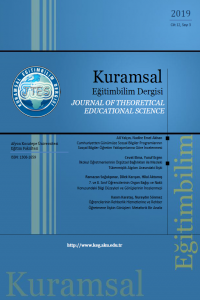Öz
Erken çocukluk dönemi, çocuğu tanıma
ve değerlendirme açısından kritik öneme sahiptir. Bu dönemde çocukların gelişim
özelliklerine, ilgi ve ihtiyaçlarına uygun öğrenme deneyimleri sunulması ancak
çocuğun doğru bir şekilde tanınması ile mümkündür. Çocuk, ancak tüm gelişim
alanları ile tanındıktan sonra doğru bir değerlendirmeden söz edilebilir. Bu
çalışmada çocuğun gelişim ve öğrenme sürecini bütüncül bir yaklaşımla ele alan
pedagojik dokümantasyon sürecine değinilmiştir. Çocukları sorgulamaya,
düşünmeye, iletişim kurmaya, kendi öğrenmelerinin sorumluluğunu almaya, merak
ve keşfetmeye güdüleyen pedagojik dokümantasyon uygulamaları, aynı zamanda
öğretmenlerin de kendilerini geliştirmelerine imkân tanımaktadır. Pedagojik
dokümantasyonun çocukların bütün gelişim alanlarını desteklemesi, öğretmen,
çocuk ve aile arasında güvenli bağ oluşturması, olumlu iletişimi geliştirmesi,
ailenin çocuğun öğrenme sürecine dâhil edilmesine destek olması, öğretmenin
kendini değerlendirmesine fırsat sunması, çocuğun öğrenme sürecine etkin
katılımını sağlaması gibi yönleri ile okul öncesi eğitimde bir araç olarak
kullanılması önemli görülmektedir. Pedagojik dokümantasyon hakkında genel ve
açıklayıcı bilgilerin yer aldığı çalışmada; dokümantasyonun evrelerine, çocuk,
öğretmen ve aile açısından önemine, dokümantasyon türlerine, dokümantasyon
sürecine, öğretmenlerin dokümantasyonu anlama süreçlerine ve okul öncesi
dönemde pedagojik dokümantasyonun yeri ve önemine değinilmiştir.
Anahtar Kelimeler
pedagojik dokümantasyon tanıma ve değerlendirme erken çocukluk
Kaynakça
- Akman (2017). Erken çocukluk döneminde değerlendirme: Yüksek Lisans Ders Notları.
- Alcock, S. (2000). Pedagogical Documentation: Beyond Observations. Wellington, New Zealand. Institute for Early Childhood Studies. Victoria University of Wellington.
- Alkan, C. ve Kurt, M. (2014). Okul Öncesi Eğitimde Öğretim Teknolojisi. Özel Öğretim Yöntemleri (dördüncü baskı). Ankara, Anı.
- Buldu, M. (2010). Making learning visible in kindergarten classrooms: Pedagogical documentation as a formative assessment technique. Teaching and Teacher Education. 26, 1439-1449.
- Birbili, M.& Tzioga, K. (2014). Involving parents in the children’s assessment: lessons from the Greek context. Early Years 34(2), 161-174.
- Dahlberg, G., Moss, P. and Pence, A. (2007). Beyond quality in early childhood education and care: Postmodern perspectives. London, UK: Falmer.
- Deniz Kan, Ü. (2007). Okul öncesi eğitimde değerlendirme aracı olarak portfolyo. Gazi Üniversitesi Gazi Eğitim Fakültesi Dergisi, 27(1), 169-178.
Öz
Early childhood has a critical prescription for recognizing and
evaluating the child. In this period, it is possible to present learning
experiences that are appropriate for the development characteristics, interests
and needs of children, but only if the child is correctly recognized. A child
can only be referred to without a proper assessment after being sufficiently
recognized. In this study, the pedagogical documentation process which deals
with the development and learning process of the child with a holistic approach
is mentioned. Pedagogical documentation practices that encourage children to
interrogate, think, communicate, take responsibility for their own learning,
and curiosity and exploration also allow teachers to develop themselves. It is
important that pedagogical documentation is used as a tool in preschool
education in terms of supporting all development areas of children, creating a
secure bond between teacher, child and family, developing positive
communication and supporting the involvement of the family in the learning
process. In the study of general and descriptive information about
documentation; the stages of the documentation, the importance of the child,
the teacher and the family, the types of documentation, the documentation
process, and finally the process of understanding the documentation of the
teachers.
Anahtar Kelimeler
pedagogical documentation recognition and evaluation early childhood
Kaynakça
- Akman (2017). Erken çocukluk döneminde değerlendirme: Yüksek Lisans Ders Notları.
- Alcock, S. (2000). Pedagogical Documentation: Beyond Observations. Wellington, New Zealand. Institute for Early Childhood Studies. Victoria University of Wellington.
- Alkan, C. ve Kurt, M. (2014). Okul Öncesi Eğitimde Öğretim Teknolojisi. Özel Öğretim Yöntemleri (dördüncü baskı). Ankara, Anı.
- Buldu, M. (2010). Making learning visible in kindergarten classrooms: Pedagogical documentation as a formative assessment technique. Teaching and Teacher Education. 26, 1439-1449.
- Birbili, M.& Tzioga, K. (2014). Involving parents in the children’s assessment: lessons from the Greek context. Early Years 34(2), 161-174.
- Dahlberg, G., Moss, P. and Pence, A. (2007). Beyond quality in early childhood education and care: Postmodern perspectives. London, UK: Falmer.
- Deniz Kan, Ü. (2007). Okul öncesi eğitimde değerlendirme aracı olarak portfolyo. Gazi Üniversitesi Gazi Eğitim Fakültesi Dergisi, 27(1), 169-178.
Ayrıntılar
| Birincil Dil | Türkçe |
|---|---|
| Konular | Eğitim Üzerine Çalışmalar |
| Bölüm | Makaleler |
| Yazarlar | |
| Yayımlanma Tarihi | 31 Temmuz 2019 |
| Gönderilme Tarihi | 15 Mart 2018 |
| Yayımlandığı Sayı | Yıl 2019 Cilt: 12 Sayı: 3 |

